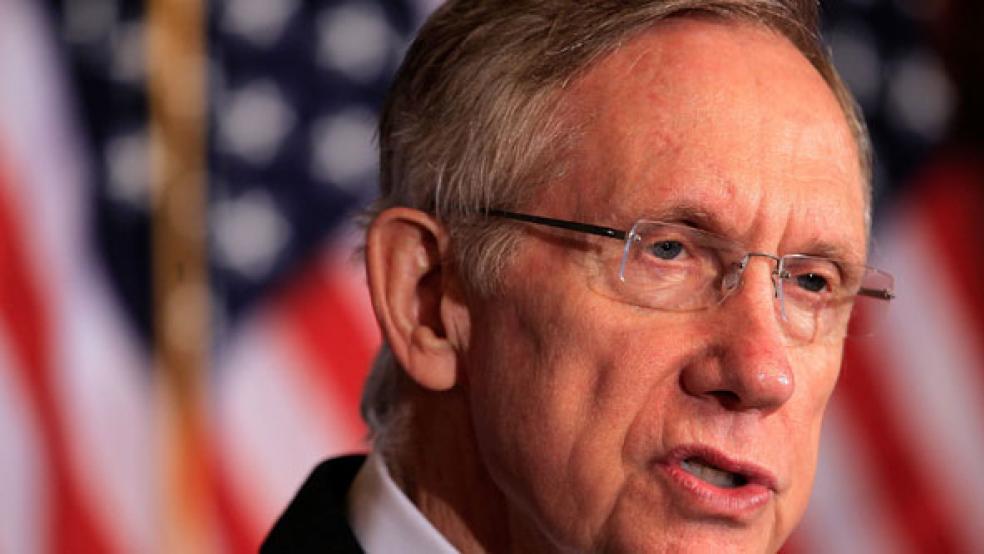Senate Majority Leader Harry Reid and Minority Leader Mitch McConnell finally appear to be getting their act together, but the budget and debt ceiling drama is far from over.
On Monday, the two senators inched closer to a deal to reopen the government and stave off default through early next year. It seemed critical enough that President Obama postponed a White House meeting with congressional leaders that had been scheduled for yesterday afternoon.
"We've made tremendous progress," Reid (D-NV) told reporters. "We are not there yet. Everyone just needs to be patient."
McConnell (R-KY) noted that not everyone will be pleased by the outcome, saying, “We’re doing our best to make everybody happy but everyone knows we’re not going to be able do that.”
RELATED: DEAL OR NO DEAL, THE U.S. HAS ITS EYE OFF THE BALL
But this is not the climax, the denouement, or even the beginning of the end to the crippling gridlock that caused the government to partially shutdown two weeks ago.
Senate Republicans are set to meet on Tuesday morning to discuss the latest progress in talks, which already has some conservative groups accusing McConnell—a Kentucky Republican facing reelection next year—of selling out. Previous attempts to work out a deal with Reid have resulted in a stalemate.
On Thursday, the Treasury Department exhausts its extraordinary measures on the debt limit to stave off an economy-bruising default. If Friday is reached without a deal in place, at risk would be the first default in the 224 years of the U.S. government.
What comes after the Monday talks between Reid and McConnell is a series of speculative “ifs.”
If they iron out a deal that the Senate quickly passes, and if House Republicans approve a compromise that would likely outrage hardliners, then the country would have less than three more months until the exact same crisis gets repeated.
In short, voters are stuck rooting for a deal that averts a disaster through the end of 2013, but offers little assurance of anything beyond that.
Under the proposed deal, the government reopen through Jan. 15 and the debt limit would be extended until Feb. 7. The January date has significance because another round of $21 billion in sequestration cuts are slated for that day, eating into the $986 billion set for annualized discretionary spending.
RELATED: DYSFUNCTIONAL DEBT CRISIS RINGS ALARM BELLS ABROAD
Republicans would extract a small pound of flesh out of Obamacare, with the deal including a requirement that the recipients of insurance subsidies have their incomes verified. But Democrats would prevent the delay of the 2010 Affordable Care Act and its medical device tax, two previous Republican demands.
The agreement is meant to create time for lawmakers from both chambers to hash out a broader budget arrangement. However, the problem on Capitol Hill has never been the absence of calendar days to chat. The issue has been a mix of hardened ideological positions and attacks from within the respective parties of any lawmaker who compromises.
House Republicans—at the behest of Sen. Ted Cruz (R-TX) and other Tea Partiers—initially demanded that Obamacare be defunded in order to keep the government running. They have since backed off that stance, requesting, instead, a year-long delay and, later, the elimination of the medical device tax.
Just by floating a deal that does little to stop Obamacare, McConnell opened himself up to criticism.
“Now Mitch McConnell is working with Harry Reid on a plan to fund Obamacare and raise the debt limit,” said Matt Hoskins, executive director of the Senate Conservatives Fund, according to The Washington Post. “Not only will his plan force Americans to pay for a law they oppose, it will force them to borrow more money to do it.”
Democrats want to use the proposed budget talk to pare back the automatic sequestration cuts, before the next round takes effect. These automatic reductions—totaling $1.1 trillion through 2021—came from the last major budget and debt ceiling compromise in 2011, the result of the failure of a super committee to agree to a deal.
“We’re not going to break the sequester cap,” Rep. Jim Jordan (R-OH) said on “Fox News Sunday.” “That’s one thing where we save the American taxpayers money here. We think that’s an important thing that we have achieved.” Conservative Republicans want to preserve the sequester—and oppose any additional tax revenue increases that could be used to offset additional spending.
But all of that is a drama that will play out in the months ahead, if Congress can simply get a deal as early as today.
As Reid said on Monday, “Perhaps tomorrow will be a bright day.”





